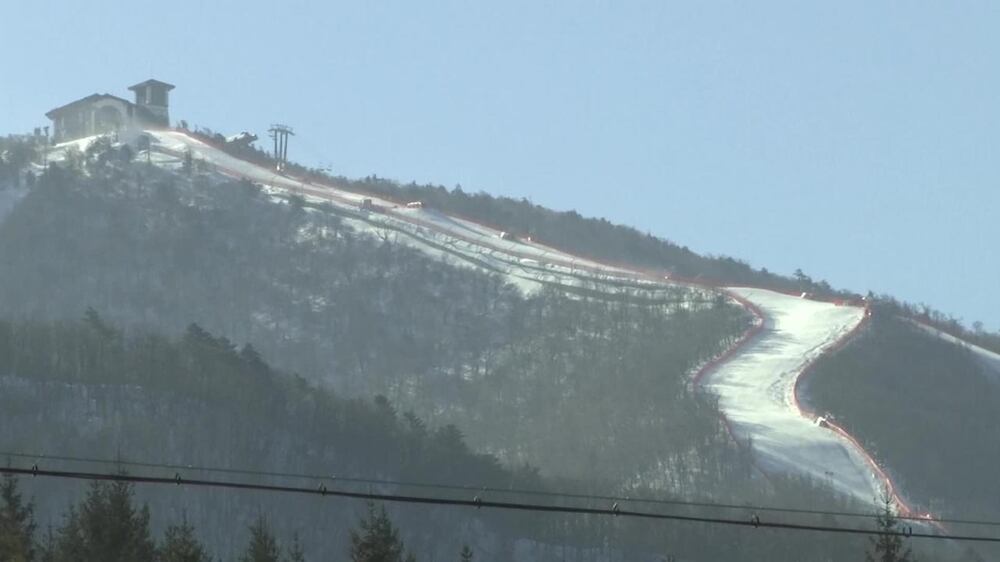Icy winds tore through the mountains at the Pyeongchang Olympics on Monday, wreaking havoc at a snowboard final, forcing the postponement of the Alpine skiing for a second successive day, and raising questions about athlete safety.
Competitors, officials and a few brave fans made their way around the Olympic venues wrapped in layers of scarves, hats and thick coats as the biting wind added a chill factor to temperatures already hovering around -20°C.
At the Yongpyong resort, winds in excess of 70 kilometres per hour prevented the Alpine skiing competition from getting under way for the second day in a row with the women's giant slalom joining the men's downhill in being moved to Thursday.
The gusts were not as strong at the Phoenix Snow Park but caused farcical conditions for the women's slopestyle final with snowboarders who had spent four years perfecting their routines blown off the hill by crosswinds.
Qualification was cancelled entirely on Sunday due to the weather but the final got under way after an hour's delay on Monday only for 20 of the 25 competitors to fall in the opening run.
American Jamie Anderson laid down the best first run to retain the title she won in Sochi four years ago but pre-event favourite Anna Gasser, who failed to land either of her runs, said the final should have been postponed.
"We tried to speak to officials but the Olympics put us under pressure to do it today," the Austrian told reporters.
"They said we had to do it today."
Anderson's compatriot Hailey Langland, who fell on the first run but put in a solid second effort to finish sixth, disagreed.
"We are snowboarders and should be able to deal with it," said the 17 year old. "The girls on the podium showed that and that is why they are up there."
Australian snowboarder Tess Coady, however, was left contemplating a lengthy period of recuperation on Monday after suffering a serious knee injury in practice on Sunday.
"Got picked up in the wind on the bottom jump in practice and my ACL was not a big fan!" she posted on Instagram.
Ian Chesterman, the Australian chef de mission, expressed his concern.
"I don't think anyone can say for sure [high winds] caused this accident but I think it certainly needs to be reviewed," he said on Monday.
Sung Baik-you, spokesman for the local organising committee POCOG, said the safety of the athletes was of the "utmost importance" in any discussions about re-scheduling.
International Ski Federation (FIS) officials remained "pretty relaxed" about the weather disruption, according to International Olympic Committee spokesman Mark Adams.
"The federations know their athletes and the conditions," he said.
"I can only assume they take all necessary precautions. There are reserve days, plenty of time to get competitions in."
Alpine skiing race directors have had contingency plans in place for several days after receiving the forecasts of the high winds, which are predicted to ease towards the end of Tuesday.
The women's giant slalom, which will take place at Yongpyong, was moved to Thursday with an earlier start time to allow a window for the men's downhill, which was postponed on Sunday.
Running races on separate mountains on the same day is hardly ideal, however, especially when one, the men's downhill, is the marquee event of Alpine skiing at the Games.
The men's Super G at Jeongseon Alpine Park has been switched to Friday, previously a rest day, to make room for the downhill.
_______________
Read more:
- K-pop fan Evgenia Medvedeva listened to Exo before setting new skating record
- Lindsey Vonn leads tributes to 'amazing' Mark McMorris as Canadian snowboarder recovers from injury to win bronze at Winter Olympics
_______________
Disruption to Alpine skiing competitions is not unusual, however, and it is a rare Games where some re-jigging of the schedule is not necessary.
The Alpine skiing at the 1998 Games in Nagano was heavily disrupted by heavy snow and rain and the men's downhill was rescheduled three times.
The schedule for the 2010 Vancouver Olympics was similarly impacted by poor course conditions and bad weather at Whistler with the men's downhill postponed by two days.
There was also some rescheduling of the Alpine skiing at the last Winter Olympics in Sochi when rain, fog and rising temperatures disrupted the final part of the competition.
"It is a little bit early to discuss [scrapping competitions]," Adams added.
"Nagano held the downhill five minutes before the closing ceremony. We have reserved space so this is a touch premature."





